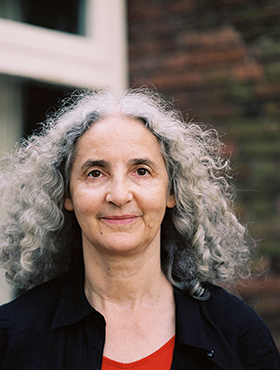Music
The Music Section was founded in the first half of the 19th century and looks back over a succession of famous members. Composers like Richard Wagner, Ferruccio Busoni, Arnold Schönberg and Igor Stravinsky were a part of it. Some of them conducted master classes, in which the new compositional thinking found a home.
The work of the programme today attempts to react to current artistic and social questions. Its projects grapple with explosive technological developments. They mostly focus on thematic issues, oriented to compositional aspects or personal styles, and have largely taken up interdisciplinary perspectives, especially in recent years.
Directors
Carola Bauckholt has been director of the Music Section since November 2021, and Iris ter Schiphorst is the deputy director.

Carola Bauckholt, Director

Iris ter Schiphorst, Deputy Director
The directors in the past few decades were Manos Tsangaris (2012-2021), Erhard Grosskopf (2008-2012), Udo Zimmermann (2003-2008), Frank Michael Beyer (1986-2003); deputy directors were Samir Odeh-Tamimi (2018-2021), Enno Poppe (2012-2018), Manfred Trojahn (2008-2012), Erhard Grosskopf (2003-2008), Georg Katzer (1994-2003).
Program Focuses
Productions that arise in the context of exhibitions at Akademie der Künste reflect a wide range of types of events that have been developed. Following the concert series related to central undertakings, such as “Kunst und Revolte '89“ (Art and Revolt '89, 2009) or the Cage year “A Year from Monday. 365 Days of Cage” (2011-12), extensive musical and performative programmes have been created in recent years, including “Music in Vertigo of Reality” (2014), “Musik für Alle” (Music for Everyone, 2015) and “Dezentrale Musik” (Decentralized Music, April 2016). While dealing with the model of street music, for instance, the latter turned to examples of musical practice in public space, and reassessed socio-political questions through diverse sound and artistic actions, as a complementary offer to the exhibition DEMO:POLIS.
Work with young artists and cultural mediation
One of the most fascinating tasks of the Akademie is promoting young artists. Since its re-founding in 1993, this has been made possible in the framework of a fellowship programme, following in the footsteps of the continuation of the former master class heritage by the East German Akademie der Künste. Young art and culture assumed an exceedingly prominent position as soon as the following year in the two-month interdisciplinary “X 94” festival hosted by the then Department of Music. The fellowship programme is currently entrusted to and supervised by the JUNGE AKADEMIE (Young Academy). The Music Section selects its fellows by a jury of its members, which changes every year. The concerts of “Alles und nyx. New Contemporary Sound” (2012) were a testament to the successful work of many former fellowship holders, who have achieved international recognition in the interim.
As part of the music appreciation programme Netzwerk Neue Musik, a project funded by the Kulturstiftung des Bundes (German Federal Cultural Foundation), the section operated diverse projects with great enthusiasm under the auspices of “ohrenstrand.net” from 2008–11. They were targeted to children, young people, and adults in the federal state of Brandenburg – mostly without any musical training – and conceived with local partners. In longer working phases, professional musicians and composers developed performances ready for the stage. The intensive attention generated enthusiastic reactions, as could be exemplary experienced in Cottbus at the of end of the project with “blechenwind. Das Lied vom elektrischen Wind” (blechenwind. The Song of Electric Wind, 2011).
Prizes
The Music Section – on a rotating basis with other Sections – awards the Berlin Art Prize – Grand Prize and the Berlin Art Prize. It selects the laureates for the Busoni Composition Prize for the promotion of young composers, donated by Aribert Reimann in 1988.






